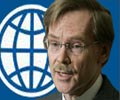
The World Bank said on Tuesday it would considerably increase its financial aid for developing countries in order to keep the poorest and most vulnerable from the impact of aggravating global financial crisis. The Bank aims to lend up to $100 million over next three years to support countries facing budget deficit in carrying on developmental programme.
Making this announcement, the bank said lending to emerging economies could almost triple to above $35 billion this year as compared to $13.5 billion last year. This sharp increase in assistance will sustain long-term investments upon which recovery and development will depend.
The bank has also lowered its growth forecast of the developing countries to 4.5 percent for 2009 in comparison to previously estimated 6.4 percent, due to a combination of financial turmoil, slower exports and weaker commodity prices.
Ahead of the Group of 20 (G20) Summit starting on this weekend at Washington, the World Bank President Robert B. Zoellick said in an official release, “The global financial crisis, coming so soon after the food and fuel crises, is likely to hurt the poor most in developing countries.”
“The response to this crisis must be global, coordinated, flexible and fast. While the challenges need to be addressed at the country level, it is more critical than ever that the international community acts in a coordinated and supportive way to make each country’s task easier,” he added too.
According to current World Bank estimation, a one percent decline in developing country growth rates will further push 20 million people into poverty, while the latest high food and oil prices have already been driven 100 million people into poverty.
This apart, the bank is also planning to accelerate grants and interest-free loans to the world’s 78 poorest countries. In addition, the bank along with its arm International Finance Corporation (IFC) would lend up to $30 billion to the private sectors in developing countries.
The expanded IFC fund aims to facilitate global trade finance programmes, to launch a global equity fund to recapitalise distressed banks, and to provide roll-over financing and help recapitalise existing, viable, privately-funded infrastructure projects facing financial distress.
|
|


Comments:
Oluwatimilehin Joshua
November 18, 2010 at 12:00 AMamofah george
April 14, 2009 at 12:00 AMmy greatest burden is how will this organisation help individuals like students or personal employers doing petty trading in developing countries. for instance myself becauce of 3000 us dollas i was drop out of school last two years and now working with a company to ernable me save some money to further my education
Please i wish to apply for your schorlarship award
and for you to help me sign my guarantor been that i am less priviledge to further my education.
Thanks for your immediate reply.Joshua Oluwatimilehin OKENE, KOGI STATE NIGERIA WEST AFRICA.